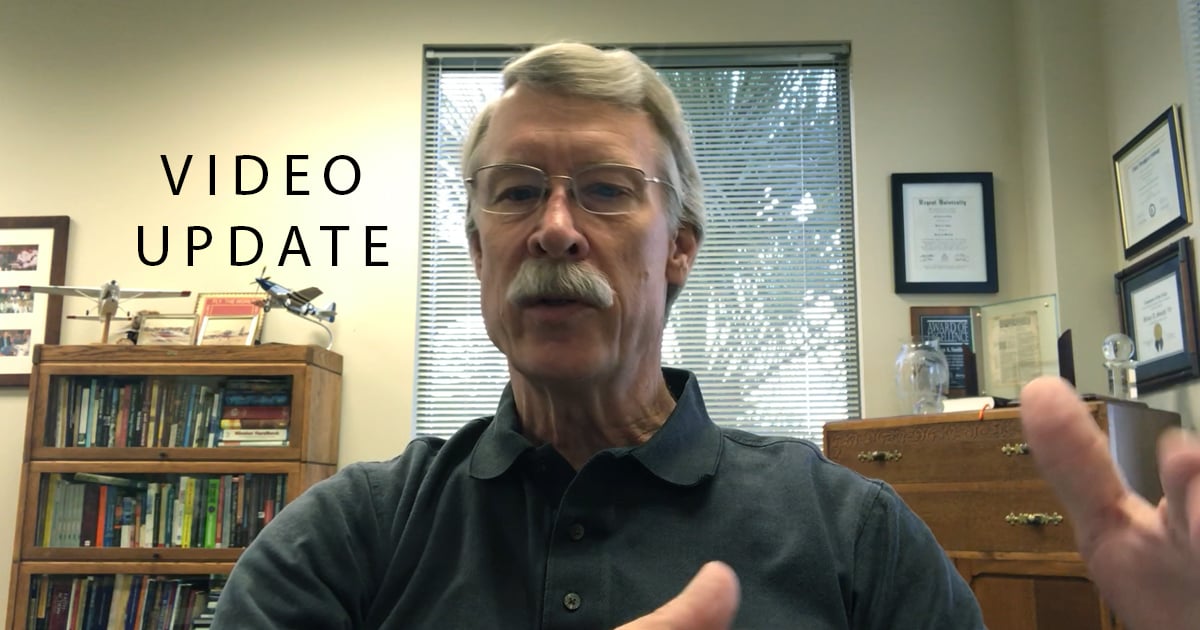Video: May 18th Bible Translation Update

Bruce Smith

A few years ago, I had the opportunity to visit with one of our Bible translation partners in Jos, Nigeria. I remember walking across the campus of their translation center there in an open area between the dormitories, and office buildings, and the auditorium. And as we were walking across this open area, I remember sort of stumbling on something on the ground. And as I looked down I realized that the ground we were walking across was furrowed and I thought, “Oh, this is an interesting strategy!” ...
Video Transcript:
A few years ago, I had the opportunity to visit with one of our Bible translation partners in Jos, Nigeria. I remember walking across the campus of their translation center there in an open area between the dormitories, and office buildings, and the auditorium. And as we were walking across this open area, I remember sort of stumbling on something on the ground. And as I looked down I realized that the ground we were walking across was furrowed and I thought, “Oh, this is an interesting strategy!”
And so I asked the director, “Are you releasing this land to local farmers so that they can grow some crops and you can generate some revenue?”
And the director said, “No it's not exactly that.” And he was very quiet but as I talked further with him, he eventually admitted that the land was being farmed by their team members. And I said, “Well, why is that happening?”
He said, “Well, when we can't pay salaries, at least we can have some ground to grow some crops on so that our families can have food.”
I remember how sobering that was to just think about the stress that they face—really routinely—just for survival. As they're trying to do this ministry, trying to help all the languages of their country have God's Word, just struggling with knowing whether they're going to have enough food for their own families.
Why do I tell the story today?
I'm telling it because we're starting to get news from our partners overseas regarding the impact of the coronavirus around the world. And I've said in some of my previous video updates that the coronavirus is not even in the top 20 threats that many of them are facing. But what we're realizing now is that increasingly the number one threat that they're facing is the economic impact, the fallout from the economic shut down globally.
The news we’re starting to get now is very distressing. They're talking about food shortages, not because the crops are not growing but because they can no longer be shipped from one location to the other. The roads are closed and they're not being shipped so there shortages of staples like rice and meat. They’re also talking about price inflation and unemployment. We’re concerned here because the unemployment rate has gone about 15%. Some of our friends are now telling us that the unemployment rate is effectively 50% or higher in their locations. I looked online and saw some of the research that's going on right now that says that 80% of people in these kind of circumstances are choosing to restrict their diet because they can't afford to pay for the food or get access to the food.
Some of the government solutions to these things are just crazy! One of the solutions I heard was the government saying, “Well, we all these food stockpiles, we have emergency supplies that are sufficient to meet everyone's need!” but the problem is they can't be shipped. So it does no one any good to have food stockpiles that can't reach the people that need them.
Another location they’re talking about donating land for farms or talking about donating seed, and unfortunately the people are going to be faced with the prospect—the dilemma—of choosing between planting their seed and eating their seed.
Before this outbreak and before the economic shutdown happened, the UN was estimating that the financial impact from the coronavirus worldwide was going to be somewhere around 2 billion dollars. Now that we had an economic shutdown of the of the world, they're now estimating close to 7 billion dollars that they're looking for in terms of meeting humanitarian needs around the world.
When I first came to work with Wycliffe Associates 20 years ago, we had no emergency fund. I remember when our first emergency popped up and there was a team of translators that were in a very difficult location that need to be evacuated to safety, and as I talked about it with all of our partners there was no emergency fund to meet these unexpected needs. So one of the things we did right then was create an Emergency 911 Fund. They idea was, [in the US] when you have an emergency you dial 911.
And so we have created that opportunity for people that basically dialed Wycliffe Associates and say, “We've got an emergency and we need your help.” So we've created that fund and we are now gathering details from our local partners to find out exactly what can we do to help their situation as its unfolding.
I don't have a lot of specifics yet, but I know that we will get those specifics. They’re just beginning to come in, and in the coming days we’ll be sure to communicate those to you. But we do have this fund. We will be communicating more details to you about how we're going to need to fund that resource in order to be able to respond to these partners around the world so that Bible translations are not stopped because of food shortages in these kind of locations.
I know that you care about these things—that's one of the things I love about our partners, our financial donors and strategic partners, is that you care about these people just like we do.
And I'll keep you informed about their circumstances and I'll let you know how you can respond in the coming days. In the meantime, stay in touch. Thanks.


